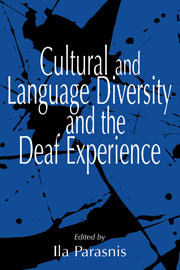Book contents
- Frontmatter
- Contents
- Preface
- PART I BILINGUALISM-BICULTURALISM AND THE DEAF EXPERIENCE: AN OVERVIEW
- PART II PSYCHOSOCIAL, COGNITIVE, AND LANGUAGE EXPERIENCES OF DEAF PEOPLE
- 5 From the Cultural to the Bicultural: The Modern Deaf Community
- 6 Early Bilingual Lives of Deaf Children
- 7 Communication Experiences of Deaf People: An Ethnographic Account
- 8 Marginality, Biculturalism, and Social Identity of Deaf People
- 9 Attitudes of the Deaf Community Toward Political Activism
- 10 Cultural and Language Diversity in the Curriculum: Toward Reflective Practice
- 11 Minority Empowerment and the Education of Deaf People
- 12 Social Assimilation of Deaf High School Students: The Role of School Environment
- PART III THE DEAF EXPERIENCE: PERSONAL REFLECTIONS
- Name Index
- Subject Index
5 - From the Cultural to the Bicultural: The Modern Deaf Community
Published online by Cambridge University Press: 05 June 2012
- Frontmatter
- Contents
- Preface
- PART I BILINGUALISM-BICULTURALISM AND THE DEAF EXPERIENCE: AN OVERVIEW
- PART II PSYCHOSOCIAL, COGNITIVE, AND LANGUAGE EXPERIENCES OF DEAF PEOPLE
- 5 From the Cultural to the Bicultural: The Modern Deaf Community
- 6 Early Bilingual Lives of Deaf Children
- 7 Communication Experiences of Deaf People: An Ethnographic Account
- 8 Marginality, Biculturalism, and Social Identity of Deaf People
- 9 Attitudes of the Deaf Community Toward Political Activism
- 10 Cultural and Language Diversity in the Curriculum: Toward Reflective Practice
- 11 Minority Empowerment and the Education of Deaf People
- 12 Social Assimilation of Deaf High School Students: The Role of School Environment
- PART III THE DEAF EXPERIENCE: PERSONAL REFLECTIONS
- Name Index
- Subject Index
Summary
Almost as stunning as the changes in the deaf community in the last thirty years have been changes in the last five years. Thirty years ago, Deaf people generically referred to their language as “the sign language”; it is now renamed “American Sign Language,” standing in contrast to the also renamed British Sign Language, French Quebec Sign Language, Thai Sign Language, and the myriad national sign languages of the world. The activities of their everyday life were called “the deaf way,” or “the deaf world”; they are now called “Deaf culture.” The last five years have seen even newer vocabulary take hold, from calls for rights of Deaf people as a “linguistic minority” to schools that can educate the “bicultural” Deaf person.
Without doubt, the new vocabulary perplexes and distresses the larger public. Intense debates have erupted between the fields of medicine and education and the “cultural activists” of the deaf community. Two prominent national magazines, the Atlantic Monthly and the Los Angeles Times Weekly Magazine have featured Deaf cultural activism as a major story (Dolnick, 1993; D'Antonio, 1993). Both chose the most extreme of clashes, a debate between Deaf people, doctors, and hearing parents over cochlear implants and whether the devices are being overprescribed to young deaf children. Deaf people are described as challenging the ulterior motives of doctors and hearing parents. Hearing parents of deaf children in response accuse Deaf people of unnatural and unnecessary claims to cultural rights.
- Type
- Chapter
- Information
- Cultural and Language Diversity and the Deaf Experience , pp. 79 - 98Publisher: Cambridge University PressPrint publication year: 1996
- 19
- Cited by



